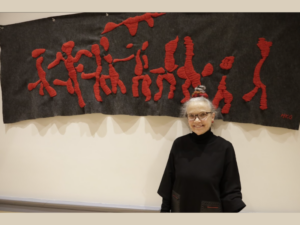Because the current practice of “every outlet for itself” is absolutely failing to rebuild local news in the US
The original mandate of the Boston Institute for Nonprofit Journalism was to produce longform investigative reporting and syndicate it to independent community news outlets around Massachusetts that cannot afford to produce deep dives themselves. Seven years agone that vital work remains a core part of our operation. However, as I have written on numerous occasions before, my BINJ colleagues Chris Faraone and John Loftus and I noticed early on that the rolling collapse of local news organizations was accelerating in the Bay State … due, in brief, to the rise of the internet and a particularly toxic type of venture-capital-fueled bad behavior by a handful of media multinationals.
With journalism in the interest of democracy under such tremendous threat, in 2019, BINJ moved to start a community organizing project in Somerville, Mass., a small diverse city just north of Boston, aimed at working with residents to figure out ways to reverse the destruction of the city’s news infrastructure—building a replicable model that we hoped other cities, towns, and counties around the US could follow. We dubbed the new endeavor the Somerville News Garden (thinking “what’s the opposite of a news desert?”)
One useful innovation that occurred to BINJ staff and Somerville volunteers a year into our grassroots initiative was to get a community foundation serving the city on board with funding nonprofits like BINJ producing news about key issues of the day. Unfortunately, Somerville had no such foundation.
So in January, after months of work, we spun off our own municipal foundation, the Somerville Media Fund. In the spring, SMF ran its first appeal for donations from residents and last week gave out its first semiannual grants. Which is nice but not particularly noteworthy.
What makes the new fund unusual is not merely that it exists—given that there are a growing number of local foundations giving grants to nonprofits producing journalism serving their communities of interest—it is how we designed it to function.
That is, there are two goals for the Somerville Media Fund. The first and most standard one is: To provide a formal mechanism through which Somerville residents can give fully tax-deductible donations to independent nonprofit organizations that provide their city with professionally-produced news–while educating high school students and the public-at-large in journalism, civics, and media literacy. However, the second goal of the fund is anomalous in the current nonprofit journalism space nationally: To ensure that all nonprofit news organizations that receive grants every six months, starting with SMF founders BINJ and the public access television station Somerville Media Center, get equal cuts of all money disbursed. Share and share alike.
And it is this goal, and the egalitarian spirit behind it, that I wish to highlight for my counterparts at nonprofit news organizations nationwide—and most especially for all large foundations and corporations giving grants to such groups.
Why? Because basically, as with everything else in 21st century America, the nonprofit journalism space is divided into haves and have-nots. For decorum’s sake, I won’t name any names in this dispatch, but everyone involved in said space knows exactly who I’m talking about. There are nonprofit news organizations that were started by rich and powerful individuals and institutions for a variety of mostly good reasons over the last decade and a half. And there are rich and powerful foundations that decided to start funding nonprofit journalism over the same period, again, for a variety of mostly good reasons.
Those larger nonprofit news groups and foundations have benefitted from being part of the same personal, social, and professional networks from word one. They are all in turn connected to major educational institutions who have put some effort into studying the crisis in local journalism and have often helped convene important strategy meetings involving representatives of the first two sectors. Naturally, all of these players have connections in the corporate world—particularly with social media giants who have played a large role in destabilizing the economic models that used to sustain local (and regional and national) news ecologies between the 19th and early 21st centuries. And are putting some money into helping local nonprofit news organizations … although not nearly as much as they could. Or, in my estimation, should.
These elite players all know and, to anthropomorphize the system in question, “see” each other. Meaning that the biggest grants flow from larger foundations and corporations into the coffers of the largest nonprofit news organizations in the US. As well as, in fairness, certain smaller nonprofit news outlets that manage to break into elite networks and get the money they need to become self-sustaining.
Yet hundreds of smaller nonprofit news organizations like BINJ that are laboring mightily to rebuild local journalism infrastructure neighborhood by neighborhood are not part of the elite structures that I am sketching out here in broad strokes. At the behest of major funders, we are herded into national consortia and made to compete with each other for much smaller amounts of money than the favored few elite news outlets receive. And, depressingly, these consortia typically include the larger well-funded outlets.
Adding insult to what I will now posit as injury, the favored larger news organizations get the lion’s share of what money is on offer through the national consortia. Leaving only crumbs for the growing legion of smaller news organizations. Who almost to a one will go under before they could ever get large enough to be considered “players” on the national funding scene.
I bring this state of affairs up in the context of discussing the Somerville Media Fund to say the following: If major funders (foundations and corporations) are really serious about helping rebuild local news outlets across the country in the interest of democracy then they must start a) giving much more money to all nonprofit news organizations that meet certain basic professional and ethical standards, and b) giving equal amounts to all qualified outlets. Share and share alike.
I am definitely in the camp of strategists that believes it is impossible for all the many nonprofit news organizations we will need to revive local news ecologies with just small donations from individuals and some fee-for-service activity (which typically cuts into the amount of time we get to spend on actually producing desperately-needed journalism).
Our local outlets will ultimately need money from government at all levels—a subject for another day—one politically and ethically acceptable way or the other. But to at least forestall our terminal funding crises we clearly need money from major journalism funders. Every penny we can get. Now. Not tiny dribbles of funds for which we’re presently made to jump through endless hoops. Performing stupid human tricks on demand that waste our valuable time and fundamentally demean us. We need real money. And we need all outlets to get the same cuts.
What I want to see, therefore, is the Somerville Media Fund writ large. I want major funders to start grant programs that simply gather up all the money they possibly can and divide it equally between all existing nonprofit news organizations. And I want all that money to be given for general operating expenses. Not for “training.” Not for touchy-feely encounter groups. Not for faux-communitarian “tables” at which “we all have a seat” but some seats are much bigger and more important than others. I want that money to be given to our nonprofit news organizations to do what we founded them to do: Produce journalism in the public interest. Produce journalism in the service of democracy.
If large funders fail to do that simple thing, the thing nonprofit news outlets like BINJ need most of all, then they are not serious about “saving journalism.” And all such outlets will do better to stop wasting time playing courtiers to such elites and start organizing ourselves into new national consortia that work solely to improve the chances of our collective survival. Incredibly difficult though that task may be.
Should we be forced to go that route, let this old saying be our watchword, ”Better to reign in Hell than serve in Heaven.”*
* A quote from Satan in Milton’s “Paradise Lost” that I have adopted as the unofficial maxim of the Boston Institute for Nonprofit Journalism.
Photo credit: “Pie” by Eric Ferdinand is licensed under CC-BY 2.0
Apparent Horizon—an award-winning political column—is syndicated by the MassWire news service of the Boston Institute for Nonprofit Journalism. Jason Pramas is BINJ’s executive director, editor of the Somerville Wire, and executive editor and associate publisher of DigBoston. He can be reached at jason@binjonline.org.








